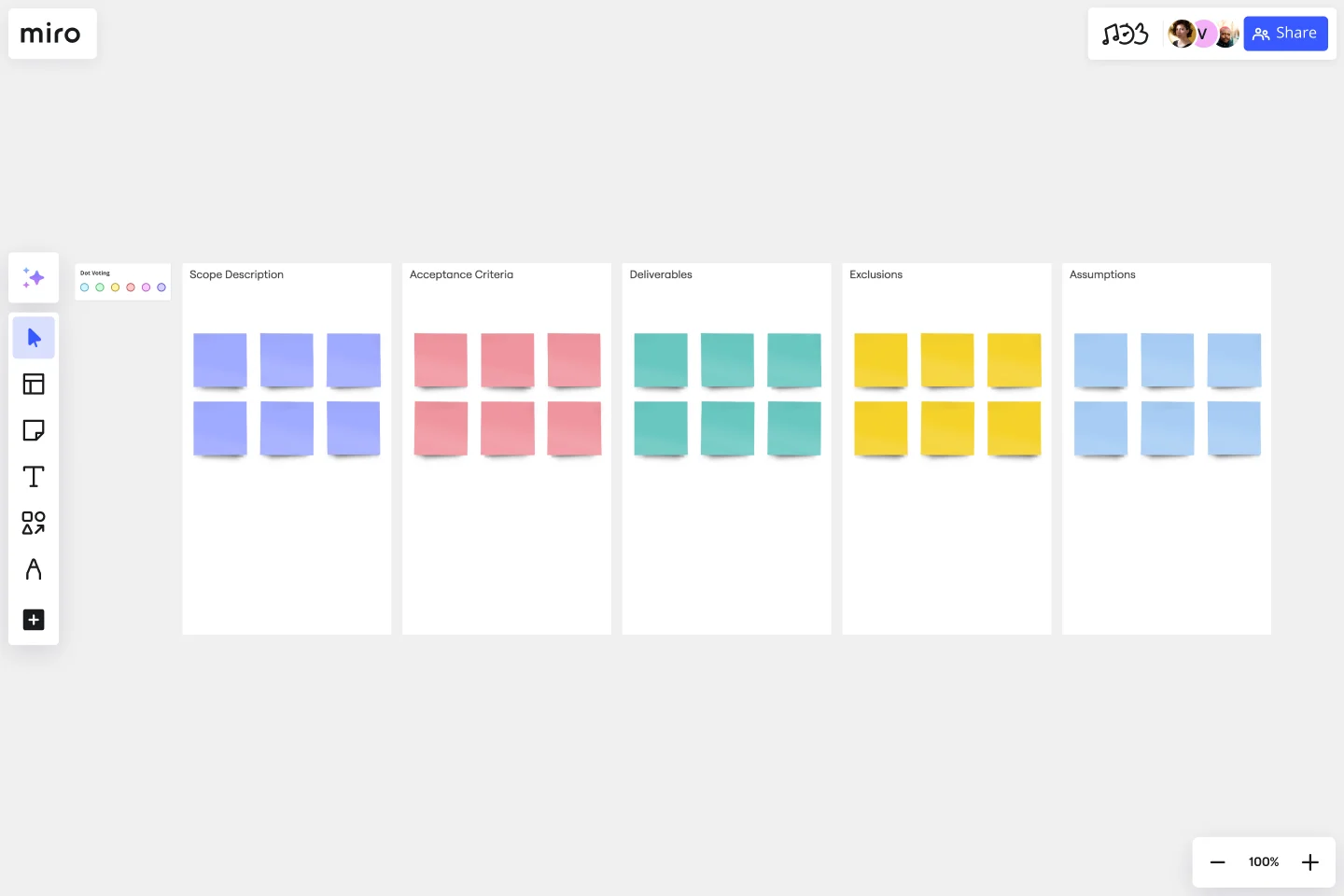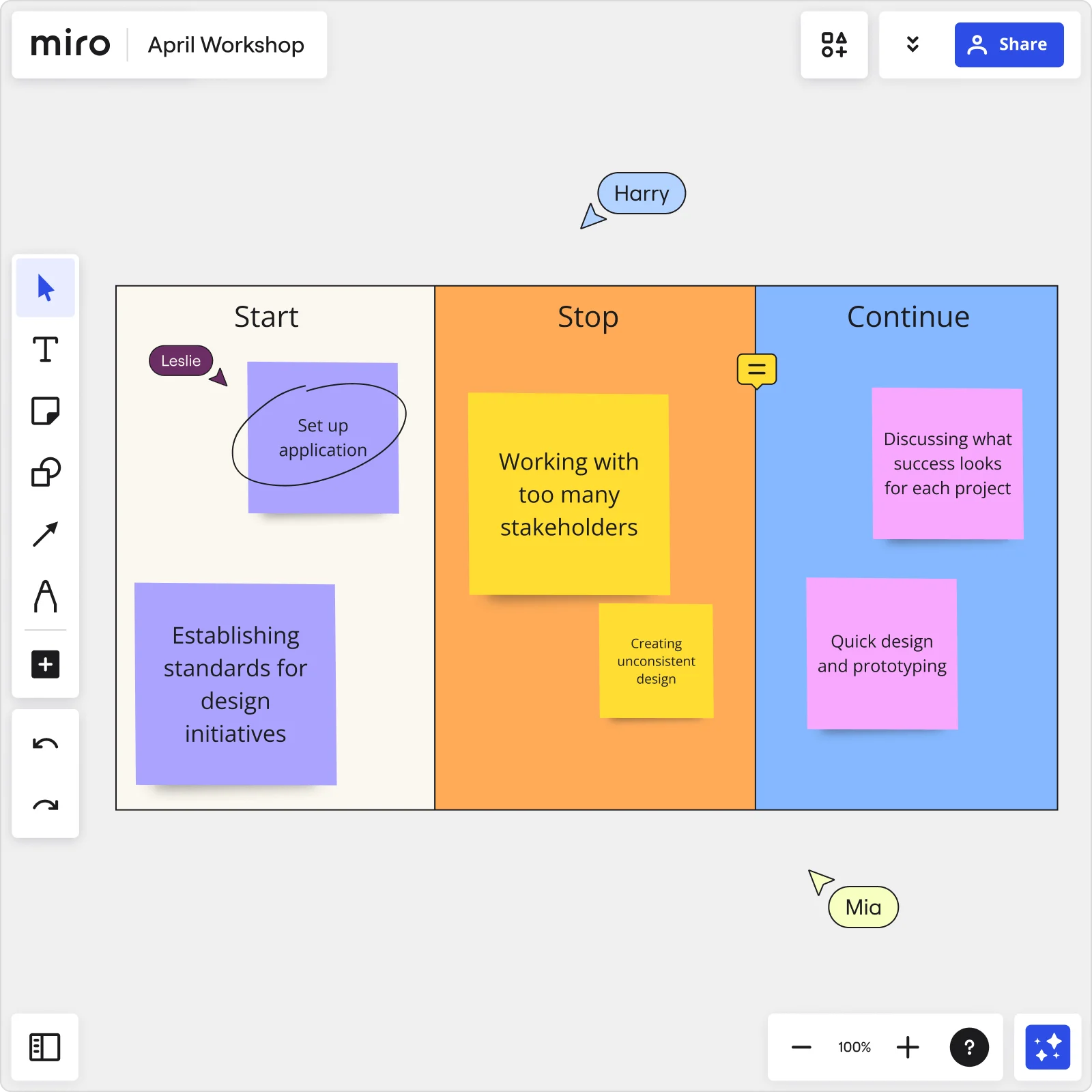
Program management vs. project management — key differences explained

Summary
In this guide, you will learn:
- Program management oversees multiple related projects for strategic goals, while project management delivers specific project outcomes within defined constraints.
- Program management has a broader, long-term scope focusing on strategic alignment and benefits realization, unlike project management's tactical, short-term focus.
- Program managers handle strategy, resources, and risks across projects; project managers manage execution, timelines, budgets, and deliverables for individual projects.
- Projects are temporary, while programs are often ongoing, delivering incremental value aligned with organizational priorities.
- Key skills and career progression tips for transitioning from project to program management, emphasizing strategic planning and stakeholder communication.
- Tools like Miro’s AI-powered visual workspace simplify managing projects and programs through better organization, resource tracking, and team alignment.
Try Miro now
Join thousands of teams using Miro to do their best work yet.
Program management and project management may seem similar, but they focus on different things. Program management is about managing multiple projects that work together toward a bigger goal. Project management, on the other hand, is about delivering one project at a time, on schedule and within budget.
In this article, we’ll walk you through the key differences between program and project management, how they work together, and why both are essential for thriving in Agile settings.
What is program management?
Program management is all about coordinating multiple related projects to achieve a larger business goal. It focuses on the bigger picture—planning, organizing, and aligning projects to ensure they work together effectively. Program managers handle resources, budgets, risks, and communication to make sure everything runs smoothly and delivers maximum value.
What does a program manager do?
Program managers oversee several projects to ensure they align with strategic goals and deliver long-term value. Their responsibilities include:
- Setting strategy: Ensuring all projects within the program align with broader business objectives.
- Managing resources: Allocating time, budget, and staff efficiently across multiple projects.
- Mitigating risks: Identifying potential challenges and developing strategies to address them.
- Communicating with stakeholders: Keeping everyone informed about program goals, progress, and changes.
- Guiding project managers: Supporting project teams to ensure individual projects contribute to the program’s success.
Strong leadership and strategic thinking are key skills for program managers, along with the ability to see the big picture while managing complex interdependencies.
What is project management?
Project management focuses on delivering specific results within a set timeline and budget. It involves planning, executing, and completing a single project. Project managers handle the details—defining goals, assigning tasks, managing risks, and keeping everything on track.
What does a project manager do?
Project managers are responsible for the day-to-day execution of a project. They ensure deliverables meet quality standards and deadlines. Key responsibilities include:
- Defining project goals: Establishing clear objectives and deliverables.
- Creating schedules: Developing timelines with milestones to track progress.
- Assigning tasks: Coordinating roles based on team members’ skills and capacity.
- Managing risks: Anticipating potential roadblocks and finding solutions.
- Reporting progress: Keeping stakeholders informed through regular updates.
Project managers rely on strong organizational skills and problem-solving abilities to keep teams aligned and on track.

Program management vs. project management — 5 differences
While project management and program management share some similarities, they serve distinct purposes and operate at different levels. Let’s break down the key differences between program and project management:
1. Scope and focus
Project management is focused on delivering a single goal, such as launching a product or completing a campaign. It’s about achieving a specific outcome within defined parameters like time, budget, and quality.
Program management takes a broader view. It coordinates multiple related projects to achieve long-term strategic objectives. Program managers focus on aligning projects with organizational goals and ensuring they deliver combined benefits that exceed what individual projects can accomplish.
2. Timeframe
Projects are temporary endeavors with clear start and end points. Once the project’s objectives are met, the project concludes.
Programs, on the other hand, often span longer periods. They oversee several projects over time and may evolve as organizational priorities shift. Programs aim to deliver value incrementally while maintaining alignment with the bigger picture.
3. Complexity
Projects are typically more straightforward, with a single focus and a smaller team working toward specific deliverables.
Programs involve higher levels of complexity. They require coordination across multiple projects, teams, and stakeholders. Program managers must navigate interdependencies and manage risks that arise from overlapping efforts.
4. Risk management
Project managers focus on risks directly tied to their specific project, such as resource constraints or unexpected delays. Their goal is to mitigate issues that could impact the project’s success.
Program managers take a broader approach to risk. They consider how risks in one project might affect others in the program and develop strategies to address challenges across the entire portfolio of projects.
5. Communication
Project managers maintain focused communication with their team and immediate stakeholders, ensuring everyone is aligned on the project’s objectives and progress.
Program managers engage with a wider audience, including executives and stakeholders from multiple projects. Their role involves ensuring alignment and maintaining transparency at all levels.

FAQs about program management vs. project management
For a closer look at the difference between program and project management, we’ve compiled answers to a few common questions. Whether you want to get a better understanding of how they’re different or are looking to make a career change, here are some things to keep in mind:
Is a program manager role more senior?
Program manager roles are typically more senior than project managers because they oversee multiple projects. Their role involves managing strategy, resources, and stakeholders at a higher level than project managers.
Do program and project managers collaborate? How?
Program managers focus on the overall strategy, while project managers handle the details of individual projects. They work together by aligning project goals with the program’s big-picture objectives, sharing resources, and solving problems as a team.
Who do project managers work with?
Project managers collaborate with cross-functional teams, clients, and stakeholders. They ensure everyone stays aligned, tasks are completed on time, and project goals are met.
How do you transition from project to program management?
To move into program management, focus on building skills like strategic planning, stakeholder communication, and managing complex projects. Gain experience leading larger projects and thinking beyond individual deliverables to broader outcomes.
Optimize your workflows with Miro
Whether you’re managing one project or an entire program, it doesn’t have to feel overwhelming.
Miro’s innovation workspace makes it easy to organize tasks, align teams, and plan ahead. And with an AI-powered visual canvas, you’ll be able to get more done in fewer clicks.
But why not see for yourself? Sign up for Miro and get started.
Author: Miro Team
Last update: October 1, 2025